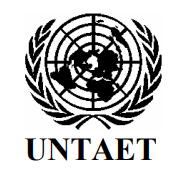
The United Nations Transitional Administration in East Timor, was a United Nations mission in East Timor that aimed to solve the decades-long East Timorese crisis in the area occupied by Indonesian military. UNTAET provided an interim civil administration and a peacekeeping mission in the territory of East Timor, from its establishment on 25 October 1999, until its independence on 20 May 2002, following the outcome of the East Timor Special Autonomy Referendum. The transitional administration was established by United Nations Security Council Resolution 1272 in 1999.

United Nations Security Council resolution 1244, adopted on 10 June 1999, after recalling resolutions 1160 (1998), 1199 (1998), 1203 (1998) and 1239 (1999), authorised an international civil and military presence in the Federal Republic of Yugoslavia and established the United Nations Interim Administration Mission in Kosovo (UNMIK). It followed an agreement by Yugoslav President Slobodan Milošević to terms proposed by President of Finland Martti Ahtisaari and former Prime Minister of Russia Viktor Chernomyrdin on 8 June, involving withdrawal of all Yugoslav state forces from Kosovo.

The United Nations Integrated Mission in East Timor (UNMIT) was established on 25 August 2006 by UN Security Council Resolution 1704. Its objectives are "to support the Government in consolidating stability, enhancing a culture of democratic governance, and facilitating political dialogue among Timorese stakeholders, in their efforts to bring about a process of national reconciliation and to foster social cohesion". In its most recent resolution on UNMIT, the Council extended its mandate until 26 February 2012. UNMIT and ISF troops left the country at the end of 2012.

The United Nations Mission in East Timor (UNAMET) was established by Security Council Resolution 1246 on 11 June 1999 for a period up to 31 August 1999. By Security Council Resolution 1257 of 3 August UNAMET was extended to 30 September 1999.

An independence referendum was held in East Timor on 30 August 1999, organised by United Nations Mission in East Timor. The referendum's origins lay with the request made by the President of Indonesia, B. J. Habibie, to the United Nations Secretary-General Kofi Annan on 27 January 1999, for the United Nations to hold a referendum, whereby East Timor would be given choice of either greater autonomy within Indonesia or independence.

The 1999 East Timorese crisis began with attacks by pro-Indonesia militia groups on civilians, and expanded to general violence throughout the country, centred in the capital Dili. The violence intensified after a majority of eligible East Timorese voters voted for independence from Indonesia. A Scorched Earth Operation by militia groups destroyed 80% of Dili's infrastructure. At least 1,400 civilians are believed to have been murdered both before and after voting. A UN-authorized force (INTERFET) consisting mainly of Australian Defence Force personnel was deployed to East Timor to establish and maintain peace.
United Nations Security Council resolution 1246, adopted unanimously on 11 June 1999, after recalling previous resolutions on East Timor, particularly Resolution 1236 (1999), the council established the United Nations Mission in East Timor (UNAMET) to organise and conduct the East Timor Special Autonomy Referendum on the future status of East Timor, scheduled for August 1999.
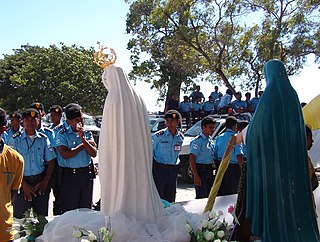
United Nations Security Council resolution 1262, adopted unanimously on 27 August 1999, after recalling previous resolutions on East Timor, particularly resolutions 1246 (1999) and 1257 (1999), the Council extended the mandate of the United Nations Mission in East Timor (UNAMET) until 30 November 1999.
United Nations Security Council resolution 1264, adopted unanimously on 15 September 1999, after recalling previous resolutions on East Timor (Timor-Leste), the Council authorised the establishment of the multinational International Force for East Timor (INTERFET) to restore peace and security in the territory, facilitate humanitarian assistance and protect the United Nations Mission in East Timor (UNAMET).

United Nations Security Council resolution 1272 was adopted unanimously on 25 October 1999, after recalling previous resolutions on East Timor, particularly resolutions 384 (1975), 389 (1976), 1236 (1999), 1246 (1999), 1262 (1999) and 1264 (1999). The council established the United Nations Transitional Administration in East Timor (UNTAET) that was responsible for the administration of the territory until its independence in 2002.
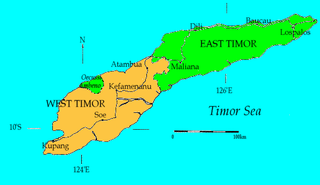
United Nations Security Council resolution 1319, adopted unanimously on 8 September 2000, after recalling previous resolutions on East Timor (Timor-Leste), the Council demanded that Indonesia take steps to disarm and disband militia on the island following the killing of three United Nations staff.

United Nations Security Council resolution 1338, adopted unanimously on 31 January 2001, after recalling previous resolutions on East Timor (Timor-Leste), particularly resolutions 1272 (1999) and 1319 (2000), the Council extended the mandate of the United Nations Transitional Administration in East Timor (UNTAET) for a year until 31 January 2002.
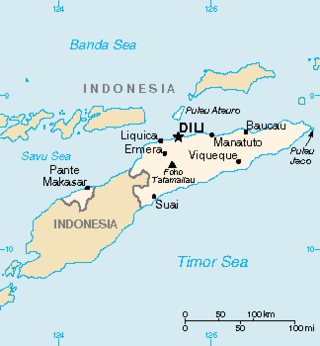
United Nations Security Council resolution 1392, adopted unanimously on 31 January 2002, after recalling previous resolutions on East Timor (Timor-Leste), particularly resolutions 1272 (1999) and 1338 (2001), the Council extended the mandate of the United Nations Transitional Administration in East Timor (UNTAET) until 20 May 2002.

United Nations Security Council resolution 1410, adopted unanimously on 17 May 2002, after recalling previous resolutions on East Timor (Timor-Leste), particularly resolutions 1272 (1999), 1338 (2001) and 1392 (2002), the council established the United Nations Mission of Support to East Timor (UNMISET) to replace the United Nations Transitional Administration in East Timor (UNTAET).
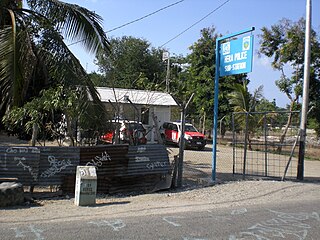
United Nations Security Council resolution 1473, adopted unanimously on 4 April 2003, after recalling previous resolutions on East Timor (Timor-Leste), particularly Resolution 1410 (2002), the Council adjusted the United Nations Mission of Support to East Timor (UNMISET) to improve its capacity to train the National Police of East Timor in light of the security situation, and slowed the downsizing of the operation.

United Nations Security Council resolution 1480, adopted unanimously on 19 May 2003, after reaffirming previous resolutions on East Timor (Timor-Leste), particularly resolutions 1410 (2002) and 1473 (2003), the council extended the mandate of the United Nations Mission of Support to East Timor (UNMISET) for a period of twelve months until 19 May 2004.

United Nations Security Council resolution 1536, adopted unanimously on 26 March 2004, after reaffirming all resolutions on the situation in Afghanistan, particularly Resolution 1471 (2003), the council extended the mandate of the United Nations Assistance Mission in Afghanistan (UNAMA) for an additional period of twelve months until 26 March 2005.

United Nations Security Council Resolution 1704, adopted unanimously on August 25, 2006, after reaffirming previous resolutions on East Timor (Timor-Leste), particularly resolutions 1599 (2005), 1677 (2006), 1690 (2006) and 1703 (2006), the Council established the United Nations Integrated Mission in East Timor (UNMIT) for an initial period of six months.
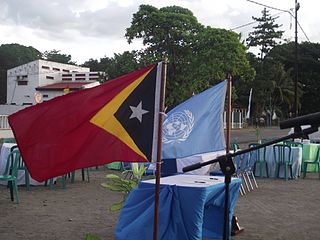
East Timor formally occurred on 20 May 2002. The country was occupied by Indonesia for 24 years from 1976 to 1999, a period during which many observers consider a genocide to have taken place. It was estimated by one report that the Indonesian occupation of East Timor was responsible for 180,000 deaths in the 24-year period. The human rights violations of the Indonesian government resulted in a home-grown resistance movement pushing for independence. Several pro-independence organisations such as the centre-left Fretilin and the centre-right Timorese Democratic Union (UDT) joined forces in 1986 in the National Council of Maubere/Timorese Resistance, a coalition which grew over time and by 1998 included all East Timorese political parties. The 1991 Dili Massacre, which was recorded on video and was widely reported to have killed between 180 and 200 people, was a turning point for the independence cause. Publicity about the atrocity stimulated the emergence of an East Timor solidarity movement in Portugal, the Philippines, Australia, and other Western countries. United States support for Indonesia ended and the U.S. military pulled out of Indonesia. Following civil unrest and protests, long-time president Suharto fell from power in May 1998 and was replaced by B. J. Habibie.

United Nations Administered East Timor refers to the period between 25 October 1999 and 20 May 2002 when East Timor was administered by the United Nations Transitional Administration in East Timor as a United Nations protectorate.
















